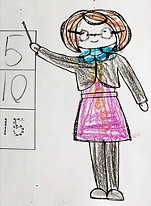The surprise exam
Preface
 This was written in 2009. I explain why I think the surprise exam paradox is just a subtle version of the paradox of the heap. This was not easy to figure out because this is one of the most confusing paradoxes in the world.
This was written in 2009. I explain why I think the surprise exam paradox is just a subtle version of the paradox of the heap. This was not easy to figure out because this is one of the most confusing paradoxes in the world.
 This was written in 2009. I explain why I think the surprise exam paradox is just a subtle version of the paradox of the heap. This was not easy to figure out because this is one of the most confusing paradoxes in the world.
This was written in 2009. I explain why I think the surprise exam paradox is just a subtle version of the paradox of the heap. This was not easy to figure out because this is one of the most confusing paradoxes in the world.
2. What’s the argument?
To resolve this paradox, we must first notice that the student’s argument cannot quite be what it seems at first sight to be.
At first sight, the student means to be arguing that the surprise exam is impossible, i.e., that it cannot take place at all. His apparent point is that, no matter when the teacher holds the exam, the class will end up knowing the exam day beforehand, and so the exam won’t be a surprise in the sense that was promised.
It’s natural to read the paradox this way and virtually everyone does so. Indeed, the manner in which the paradox is normally raised invites this reading at once. But a closer look suggests that this reading cannot be quite right.
The student cannot really be arguing that the surprise exam is impossible because, at various points of his argument, he blithely presumes that the class knows that the surprise exam will occur!
This is not obvious but a close look bears it out.
For example, in reasoning that if the exam falls on Friday, the class would know about this by Thursday’s end (because only one day would be left), he presumes that the class knows that an exam is bound to occur.
Thereafter, in reasoning that if the exam falls on Thursday, the class would know about this by Wednesday’s end (by reasoning that Friday can’t be the exam day on pain of failing to be a surprise), he presumes that the class knows that the exam will be a surprise.
But how can the student be arguing that the surprise exam cannot occur if his very argument presumes that the entire class knows that a surprise exam will occur? That doesn’t make any sense. What is the student really up to?
To resolve this paradox, we must first notice that the student’s argument cannot quite be what it seems at first sight to be.
At first sight, the student means to be arguing that the surprise exam is impossible, i.e., that it cannot take place at all. His apparent point is that, no matter when the teacher holds the exam, the class will end up knowing the exam day beforehand, and so the exam won’t be a surprise in the sense that was promised.
It’s natural to read the paradox this way and virtually everyone does so. Indeed, the manner in which the paradox is normally raised invites this reading at once. But a closer look suggests that this reading cannot be quite right.
The student cannot really be arguing that the surprise exam is impossible because, at various points of his argument, he blithely presumes that the class knows that the surprise exam will occur!
This is not obvious but a close look bears it out.
For example, in reasoning that if the exam falls on Friday, the class would know about this by Thursday’s end (because only one day would be left), he presumes that the class knows that an exam is bound to occur.
Thereafter, in reasoning that if the exam falls on Thursday, the class would know about this by Wednesday’s end (by reasoning that Friday can’t be the exam day on pain of failing to be a surprise), he presumes that the class knows that the exam will be a surprise.
But how can the student be arguing that the surprise exam cannot occur if his very argument presumes that the entire class knows that a surprise exam will occur? That doesn’t make any sense. What is the student really up to?
Menu
 What’s a logical paradox?
What’s a logical paradox? Achilles & the tortoise
Achilles & the tortoise The surprise exam
The surprise exam Newcomb’s problem
Newcomb’s problem Newcomb’s problem (sassy version)
Newcomb’s problem (sassy version) Seeing and being
Seeing and being Logic test!
Logic test! Philosophers say the strangest things
Philosophers say the strangest things Favourite puzzles
Favourite puzzles Books on consciousness
Books on consciousness Philosophy videos
Philosophy videos Phinteresting
Phinteresting Philosopher biographies
Philosopher biographies Philosopher birthdays
Philosopher birthdays Draft
Draftbarang 2009-2025  wayback machine
wayback machine
 wayback machine
wayback machine
 Paradox Lost (1971), by Ian Stewart.
Paradox Lost (1971), by Ian Stewart.
